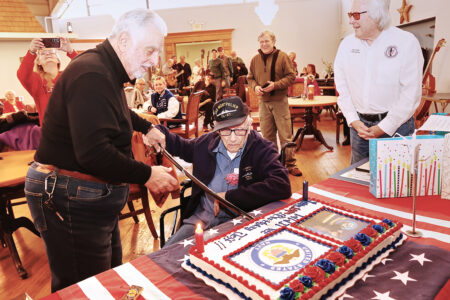Methodist faith affected McKinley’s life
Editor’s note: This is part of a weekly series marking the 120th anniversary of Niles native William McKinley’s U.S. presidency.
President McKinley had a devout evangelical faith. His Methodist faith deeply affected him throughout his life. Historians consider him to be one of our most intensely religious presidents.
The formation of McKinley’s faith began in Niles. His parents were one of the founders of the First United Methodist Church there. Members of the congregation recalled the procession of the McKinleys, big and little, going to church as a “familiar sight.” It was said that his mother and sister “ran the church, all but the preaching.”
President McKinley credited his mother, Nancy McKinley, with forming his deep faith. His mother was a devout Methodist and William followed his mother’s example. Nancy made sure all the children were enrolled in Sunday School before they started public school.
When they moved from Niles, the McKinleys immediately joined the Poland Methodist Church. McKinley’s faith deepened during the years he lived in Poland. He formally professed his faith at the age of 10. He attended a Methodist camp meeting outside of Poland at the age of 16 and announced his desire to be baptized. McKinley proclaimed, “Religion seems to be the best thing in all the world,” and, “Here I take my stand for life.” McKinley was then baptized by full immersion in a stream near Poland.
During his time in the Civil War, McKinley continued to attend religious services whenever possible. His faith helped him deal with the horrors of war.
McKinley had decisions to make after the Civil War on which career to pursue. His mother was prodding him to become a Methodist minister. When he told her he had decided to become a lawyer, she was very disappointed. The day before McKinley’s presidential inauguration, Abner McKinley remarked to their mother, “Mother, this is better than a bishopric!”
McKinley joined the Church of our Savior Methodist Church in Canton. Although he and Ida were married in the Presbyterian church, McKinley still remained a Methodist. He was the Sunday School superintendent and a longtime trustee of his church.
McKinley, throughout his life, read the Bible daily, testified to his faith when asked and followed Christian moral norms. He joined the Foundry Methodist Church in Washington when he was elected president. He went to church every Sunday without Ida. His great joy was to invite friends to the White House on a Sunday evening and have a hymn sing.
McKinley sought God’s guidance when making decisions and devising policies throughout his presidency. The declaration of war against Spain and the decision to take control of the Philippines were guided by his faith. His decision-making process was explained to a group of five Methodist ministers who came to visit the president Nov. 21, 1899.
As the clergymen were about to leave, President McKinley said the following: “Hold a minute longer. Not quite yet, gentlemen! Before you go, I would like to say a word about the Philippines’ business. I have been criticized a good deal about the Philippines, but I don’t deserve it. The truth is I didn’t want the Philippines and when they came to us as a gift from the gods, I did not know what to do with them. I sought counsel from all sides — democrats as well as republicans — but got little help. I walked the floor of the White House night after night until midnight; and I am not ashamed to tell you gentlemen that I went down on my knees and prayed to Almighty God for light and guidance more than one night.”
Finally, he said the answer came to him, “that there was nothing left for us to do but to take them all and to educate the Filipinos and uplift and Christianize them and by God’s grace do the very best we could by them, as our fellow men for who Christ also died. And then I went to sleep and slept soundly, and the next morning I sent for the chief engineer of the War Department (our map maker), and I told him to put the Philippines on the map of the United States (pointing to a large map on the wall of his office) and there they will stay while I am president.”
Patrick Finan of Cortland is the retired former library director of the McKinley Memorial Library in Niles.
columns@tribtoday.com

